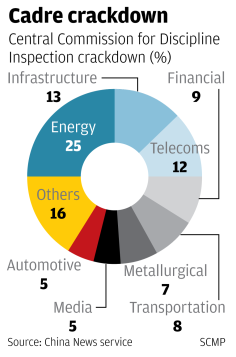
A quarter of Chinese SOE executives investigated for corruption work in energy sector
From November 2012 to April, 124 top officials in state-owned enterprises held on suspicion of corruption, 13 per cent working in infrastructure, 12 per cent in telecoms

China’s anti-graft authorities are continuing to investigate state-run energy companies, as mainland media reported that senior energy-sector officials account for a quarter of all fallen state-owned enterprise (SOE) executives.
China News Service reported that executives working in the mainland’s infrastructure sector were the second largest group to be probed by the top corruption watchdog, the Central Commission for Discipline Inspection (CCDI).

Since the 18th Party Congress in November 2012 until early this month, the CCDI has detained 124 top-level officials, or “tigers”, working for SOEs.
Out of this total, 25 per cent work in energy, with 13 per cent in infrastructure, 12 per cent in telecoms, 9 per cent in finance, 8 per cent in transportation, 7 per cent in metallurgy, 5 per cent in media, 5 per cent in the automotive industry, and 16 per cent in other sectors.
Within the energy sector, large numbers of senior executives in coal, petroleum, natural gas, and electricity have faced corruption allegations.
On Monday night, graft authorities announced that Wang Tianpu, the second-highest ranked official at China’s largest oil refiner, had been detained by investigators on suspicion of “serious violations of discipline and law” – a euphemism for corruption. Wang was president of China Petrochemical Corporation, also known as Sinopec.
The other two state-owned oil giants, China National Petroleum Corporation (CNPC) and China National Offshore Oil Corporation, have also seen their president or vice-president detained by graft investigators in recent months.
Earlier this month, Jiang Jiemin, a former chairman of the state-run CNPC, China's biggest petroleum company, admitted corruption and abuse of power when he went on trial in Hubei province.
Zhu Lijia, a public policy professor at the Chinese Academy of Governance told China News Service that the corporate structure of energy companies – typically monopoly enterprise that provided a public service, was very large.
The state management of these sectors had been relatively closed, which meant this sector was more likely to breed corruption, he said.